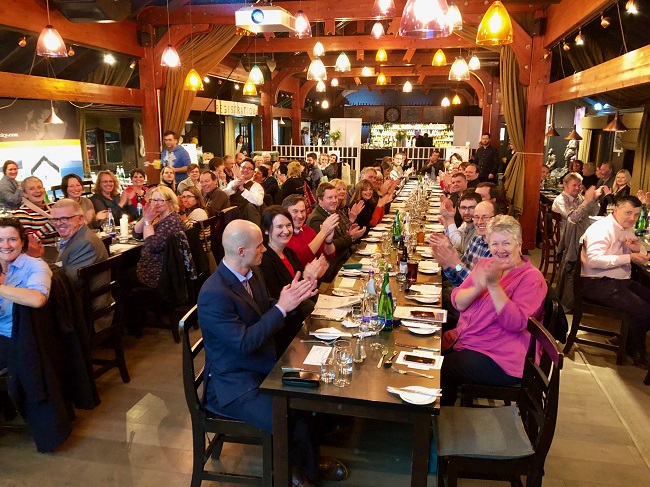Rural Innovation Support Service: A Growing Appetite for Island Produce | Scottish Rural Network

From growing lemons on Lewis to a Michelin-starred chef cooking Skye mutton, Rural Innovation Support Service (RISS) groups are pioneering a range of new routes to take local produce to market on the islands. RISS provides professional support to farmers interested in trying new things. It connects them with the right people and helps them develop a viable project.
On the Isle of Lewis high winds, low temperatures and rain have made it difficult to grow fruit and vegetables – until now. Using polytunnel technologies developed specifically for their weather conditions, the island’s growers are now producing salad, berries and even lemons in what SAC consultant Rob Black estimates to be 8000 square metres of polycarbonate tunnels.
Rob is the facilitator of a Rural Innovation Support Service (RISS) group that aims to bring these growers together with local retailers and shoppers to establish a short, sustainable island supply chain.
“Our landscape is tough,” explains Rob. “It’s moorland, rough grazing, rocky – it can be hard to make a living. But we have more and more tourists, and there is an increasing demand for local produce. This presents new opportunities for crofters.
“What’s being grown in these polytunnels is incredible. We have seen fantastic salad leaves, root vegetables and fruits, even lemons! Courgettes and cucumbers all with a really rich colour that taste amazing! Crofters are now growing tea, trees, and even cosmetics materials.”
Group member William Murray, says: “We took on a Polycrub two years ago, initially to grow produce for our own consumption, but quickly realised that we were growing more than we could use. We thought about selling the excess but didn’t know where to look.”
“This RISS project will enable producers like Mr. Murray to meet with local markets to discuss supply opportunities across the island,” says Rob, who is planning a showcase event on October 22.
Further south, another RISS group has been investigating whether there might be appetite on the Isle of Skye for locally sourced mutton, rather than just for lamb.
Skye mutton could be a winner not only for the island’s palates but also for its economy. “Skye sheep producers would see three times the value if they could sell mutton locally,” says Janette Sutherland of SAC Consulting, who led the group. “Rather than selling sheep to mainland buyers before the winter, they could wait and turn them out onto the species-rich grassland and heather for finishing in the summer – it makes better use of resources and fits in with demand from tourists.”
Janette, who is based on Skye, joined up with food and drink consultant Calum Johnston, also of SAC Consulting, and the pair began by surveying chefs, restaurant owners and sheep producers to get their views on potentially marketing mutton to tourists. They then ran a recipe competition for West Highland College catering students to find innovative ways to cook the meat, with the winning recipe – haggis-spiced mutton faggot – prepared by chef Scott Davies of the island’s famous Three Chimneys restaurant and served to over 100 guests at a Skye Connect dinner last November.
 “It was tremendous, really tasty!” said Janette. “It’s always struck me that although people on Skye eat mutton at home, you never see it on menus, so tourists don’t get the opportunity to try it.”
“It was tremendous, really tasty!” said Janette. “It’s always struck me that although people on Skye eat mutton at home, you never see it on menus, so tourists don’t get the opportunity to try it.”
Janette and Calum are currently looking at Skye Mutton’s next steps, hoping to set up a co-op of farmers and crofters and create a project officer post to look after the buying and selling between the co-op and the chefs.
To get involved in the polyproduce showcase event on Lewis on October 22nd, email [email protected] or call 01851 703 103.
Part of Scottish Rural Network (SRN), RISS is led by Soil Association Scotland in partnership with SAC Consulting, SAOS, Scotland Food and Drink and Innovative Farmers. To find out more about RISS, including how to pitch your next great idea, visit their website.
